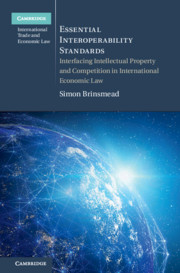 Essential Interoperability Standards
Essential Interoperability Standards Book contents
- Essential Interoperability Standards
- Cambridge International Trade and Economic Law
- Essential Interoperability Standards
- Copyright page
- Dedication
- Contents
- Foreword
- Preface
- Abbreviations
- Part I Foundations and Problems
- Part II The Impact of Intellectual Property and Competition Laws
- Part III Towards Liability and Compensation
- 6 Exclusive Property Rules or Liability Rules for Interoperability Standards and Standards Essential Intellectual Property?
- 7 Access to Interoperability Standards and Standards-Essential Intellectual Property
- 8 Concluding Observations
- 9 Draft Expert Manual
- Bibliography
- Index
7 - Access to Interoperability Standards and Standards-Essential Intellectual Property
International Dimensions
from Part III - Towards Liability and Compensation
Published online by Cambridge University Press: 26 October 2021
- Essential Interoperability Standards
- Cambridge International Trade and Economic Law
- Essential Interoperability Standards
- Copyright page
- Dedication
- Contents
- Foreword
- Preface
- Abbreviations
- Part I Foundations and Problems
- Part II The Impact of Intellectual Property and Competition Laws
- Part III Towards Liability and Compensation
- 6 Exclusive Property Rules or Liability Rules for Interoperability Standards and Standards Essential Intellectual Property?
- 7 Access to Interoperability Standards and Standards-Essential Intellectual Property
- 8 Concluding Observations
- 9 Draft Expert Manual
- Bibliography
- Index
Summary
Having developed a suitable normative approach, this chapter considers how best to achieve this, in light of current international law. A variety of legal modalities (treaty or soft law), fora (e.g. existing or standalone forum) and drafting approaches (multi-stakeholder or expert-led) are considered. An international expert-led soft law approach, outside the auspices of any existing international body, is recommended in the first instance, noting that, in due course, a more permanent forum may be warranted and that, indeed, binding treaty approaches may also be contemplated in the longer term. It is finally considered whether such an approach would remain consistent with existing international law, notably international intellectual property law. It is concluded that the proposed approach would be fully consistent with existing international law.
Keywords
- Type
- Chapter
- Information
- Essential Interoperability StandardsInterfacing Intellectual Property and Competition in International Economic Law, pp. 279 - 332Publisher: Cambridge University PressPrint publication year: 2021
